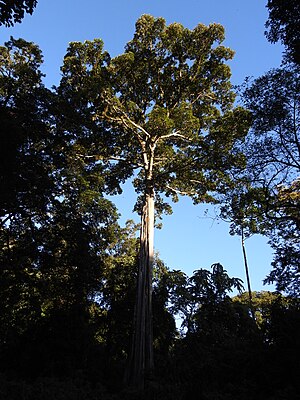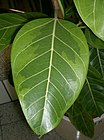Note: This is a project under development. The articles on this wiki are just being initiated and broadly incomplete. You can Help creating new pages.
Difference between revisions of "Ficus altissima"
| Line 1: | Line 1: | ||
[[File:Ficus altissima DSCN1379.jpg|thumb|right]] | [[File:Ficus altissima DSCN1379.jpg|thumb|right]] | ||
| + | |||
'''Ficus altissima''' is a massive, evergreen tree with a large, spreading crown. It can grow upto 30 metres or more tall. The bole can be 40 - 90cm in diameter, with low buttresses. | '''Ficus altissima''' is a massive, evergreen tree with a large, spreading crown. It can grow upto 30 metres or more tall. The bole can be 40 - 90cm in diameter, with low buttresses. | ||
==Uses== | ==Uses== | ||
Latest revision as of 12:47, 22 October 2020
Ficus altissima is a massive, evergreen tree with a large, spreading crown. It can grow upto 30 metres or more tall. The bole can be 40 - 90cm in diameter, with low buttresses.
Contents
- 1 Uses
- 2 Parts Used
- 3 Chemical Composition
- 4 Common names
- 5 Properties
- 6 Habit
- 7 Identification
- 8 List of Ayurvedic medicine in which the herb is used
- 9 Where to get the saplings
- 10 Mode of Propagation
- 11 How to plant/cultivate
- 12 Commonly seen growing in areas
- 13 Photo Gallery
- 14 References
- 15 External Links
Uses
[[:Category:Ayurvedic Herbs known to be helpful to treat |]], [[:Category:Ayurvedic Herbs known to be helpful to treat |]], [[:Category:Ayurvedic Herbs known to be helpful to treat |]], [[:Category:Ayurvedic Herbs known to be helpful to treat |]], [[:Category:Ayurvedic Herbs known to be helpful to treat |]], [[:Category:Ayurvedic Herbs known to be helpful to treat |]], [[:Category:Ayurvedic Herbs known to be helpful to treat |]], [[:Category:Ayurvedic Herbs known to be helpful to treat |]], [[:Category:Ayurvedic Herbs known to be helpful to treat |]], [[:Category:Ayurvedic Herbs known to be helpful to treat |]], [[:Category:Ayurvedic Herbs known to be helpful to treat |]].[1]
Parts Used
[[:Category:Herbs with used in medicine|]], stem, leaves, Root.
Chemical Composition
Common names
| Language | Common name |
|---|---|
| Kannada | |
| Hindi | |
| Malayalam | |
| Tamil | |
| Telugu | |
| Marathi | |
| Gujarathi | |
| Punjabi | |
| Kashmiri | |
| Sanskrit | |
| English |
Properties
Reference: Dravya - Substance, Rasa - Taste, Guna - Qualities, Veerya - Potency, Vipaka - Post-digesion effect, Karma - Pharmacological activity, Prabhava - Therepeutics.
Dravya
Rasa
Guna
Veerya
Vipaka
Karma
Prabhava
Habit
Identification
Leaf
| Kind | Shape | Feature |
|---|---|---|
Flower
| Type | Size | Color and composition | Stamen | More information |
|---|---|---|---|---|
| {{{5}}} |
Fruit
| Type | Size | Mass | Appearance | Seeds | More information |
|---|---|---|---|---|---|
Other features
List of Ayurvedic medicine in which the herb is used
Where to get the saplings
Mode of Propagation
How to plant/cultivate
This species seems to be confined mainly to the higher elevations in the cooler, northerly part of its range, yet it is found in both lowland and mountainous areas in the more tropical southern part of its range, such as in Java, where it is not uncommon.[4]
Commonly seen growing in areas
Photo Gallery
References
- ↑ Indian Medicinal Plants by C.P.Khare
- ↑ [Chemistry]
- ↑ [Morphology]
- ↑ Cultivation
External Links
- Ayurvedic Herbs known to be helpful to treat
- Herbs with used in medicine
- Herbs with stem used in medicine
- Herbs with leaves used in medicine
- Herbs with Root used in medicine
- Habit - Evergreen tree
- Index of Plants which can be propagated by Seeds
- Herbs that are commonly seen in the region of Lowland
- Herbs that are commonly seen in the region of Mountain forests
- Herbs
- Pages without herbs images




